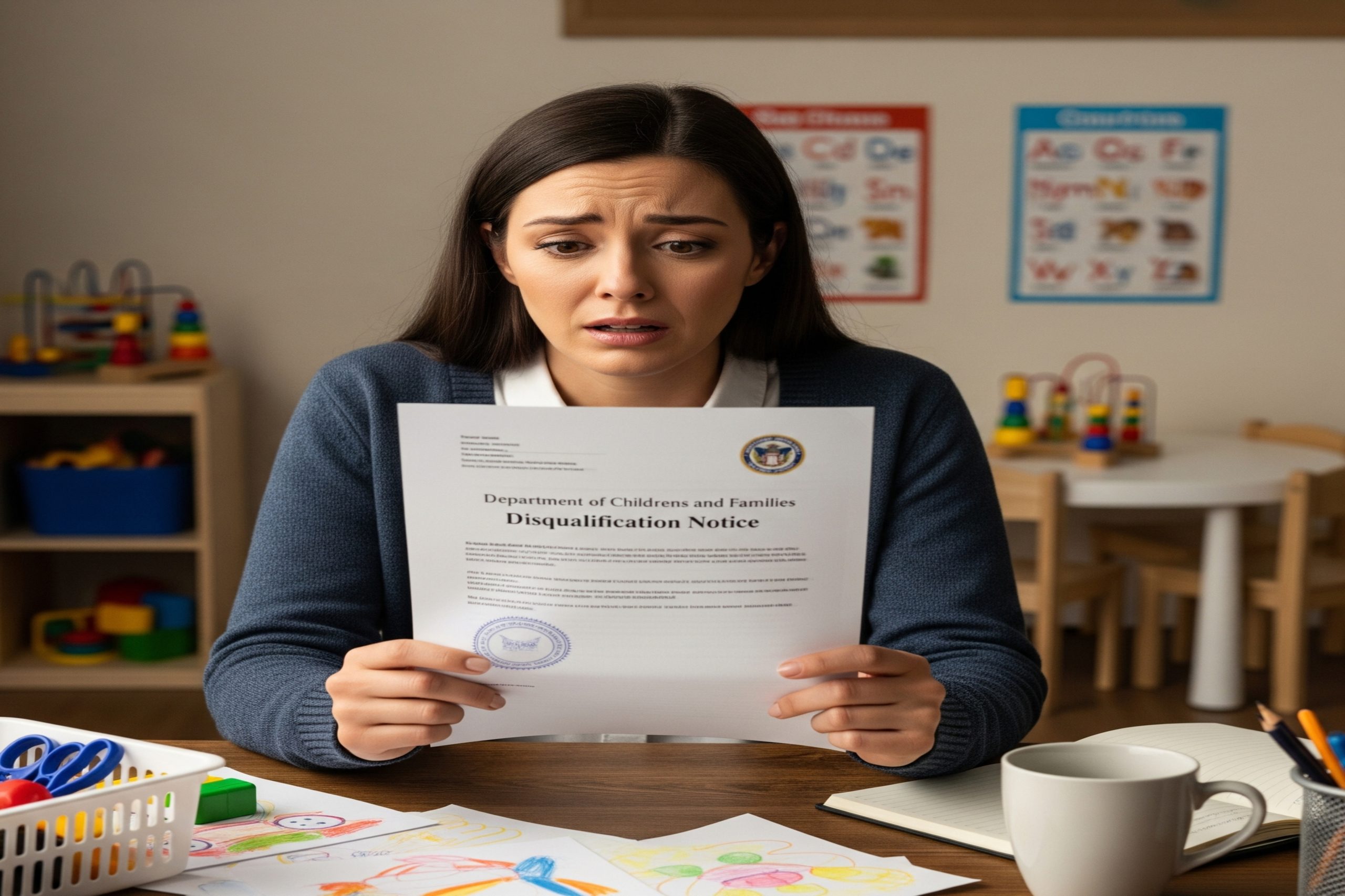
For healthcare and childcare workers in Florida, few things feel as alarming as receiving a notice of disqualification from the Florida Department of Children and Families (DCF). Whether you are a childcare provider applying for a new job, a foster parent candidate, or a nurse going through routine screening, being told you are “disqualified” can feel like the end of your career. Years of dedication, training, and education suddenly seem at risk, and the fear of losing your professional future becomes overwhelming.
At Elevate Legal Services, PLLC, we know the weight of these situations. Our Boca Raton-based law firm is dedicated to defending professionals against Department of Health (DOH) violations, administrative complaints, and administrative law hearings. If you have received a DCF disqualification letter, there may still be hope. Many individuals qualify to apply for a DCF exemption from disqualification, which restores their ability to work. To learn about your options, contact us today at 561-770-3335 or email [email protected] for a confidential consultation.
The Role of DCF in Florida Background Screenings
The Florida Department of Children and Families is responsible for conducting background screenings for individuals working with vulnerable populations. This includes childcare workers, foster parents, healthcare professionals, and others in positions of trust. The screenings use Level II background checks, which review both state and federal criminal histories.
If a screening reveals a disqualifying offense, the DCF must issue a formal notice of disqualification. Florida law, particularly §39.0138 and §435.07, governs this process. While these statutes were created to protect children and vulnerable adults, they can also create hurdles for professionals whose offenses are old, nonviolent, or resolved with restitution. The good news is that Florida recognizes the potential for rehabilitation, which is why the DCF exemption process exists.

What a DCF Exemption from Disqualification Means
A DCF exemption is not a dismissal of your past offense but a recognition that you no longer pose a risk. When granted, it restores your eligibility to work in fields that require background clearance. Some crimes, such as violent felonies, sexual misconduct, or child abuse, are permanent barriers. However, many other offenses, including theft, fraud, or nonviolent drug charges, can be reconsidered once waiting periods and court requirements are satisfied.
The distinction between absolute bars and offenses eligible for exemption is critical. For healthcare and childcare workers, understanding where your offense falls determines whether you can move forward with an application.
Why Professionals Receive Disqualification Notices
Disqualification letters typically result from three main issues. First, if a felony conviction occurred within the past three years, Florida law requires a disqualification. Second, if probation or court sanctions ended within the past two years, you remain ineligible. Third, if you owe restitution, fines, or other court costs, you cannot apply until those debts are fully paid.
For instance, consider a childcare worker who was convicted of grand theft in 2022 and completed probation in 2024. Until 2026, that worker remains disqualified. Similarly, a healthcare professional with unpaid restitution cannot apply until all financial obligations are met. While these rules may feel harsh, they are designed to establish a clear timeline for rehabilitation before an exemption is possible.
The Impact of a DCF Disqualification on Healthcare and Childcare Workers
The consequences of a disqualification extend far beyond the letter itself. For healthcare professionals such as nurses, certified nursing assistants, and caregivers, disqualification can mean the inability to work in patient care, loss of licensure opportunities, and disruption of career advancement. For childcare workers, the impact can be equally severe, as licensed facilities are prohibited from employing individuals who do not meet DCF clearance requirements.
Even if you work outside of these industries, the stigma of a DCF disqualification can create reputational harm. Employers may hesitate to hire, licensing boards may deny renewals, and your professional credibility can be questioned. These are not small risks, which is why addressing a disqualification promptly is essential.
Determining Eligibility for a DCF Exemption
Eligibility for a DCF exemption depends on three primary conditions: time since conviction, completion of probation or sanctions, and financial compliance. Florida law requires at least three years to pass since the conviction of a felony, at least two years since the end of probation or sanctions, and payment in full of any court-ordered restitution or fines.
Once you satisfy these requirements, you may begin the exemption process. Even then, success is not automatic. You must present a compelling case that demonstrates rehabilitation, personal growth, and commitment to professional standards.
The Process of Applying for a DCF Exemption
Applying for a DCF exemption involves more than filling out paperwork. Pursuant to Section 435.07(3), Florida Statutes, you must demonstrate by clear and convincing evidence that you should receive an exemption and not be disqualified from seeking certain employment opportunities.
This process can be overwhelming, as it requires strong documentation, persuasive arguments, and a clear demonstration of rehabilitation. If you are considering applying for an exemption, we strongly recommend working with an attorney who has proven experience in successfully obtaining these exemptions. At Eloevate Legal Services, PLLC, we have helped countless clients in healthcare and childcare navigate this process with confidence and success. Contact us today to discuss your case and let us help you secure your future.
This often includes letters of recommendation from employers, community leaders, or faith organizations, as well as certificates from counseling programs, proof of steady employment, or records of community service. A personal statement that explains your journey and shows accountability can also be persuasive. The DCF evaluates the severity of your offense, the time that has passed, and the evidence that you pose no risk of harm today.
What Happens If a DCF Exemption Is Denied
Not every application succeeds. If the DCF denies your exemption, you have the right to request an administrative hearing before an Administrative Law Judge (ALJ). At the hearing, you may present evidence, call witnesses, and argue your case. The judge issues a recommended order, which DCF considers before making a final decision.
For most professionals, this stage is intimidating. Administrative hearings follow strict rules and require strong legal advocacy. Having an experienced administrative law attorney can mean the difference between another denial and finally restoring your eligibility.

Why Legal Representation Is Essential
Many professionals try to navigate the exemption process alone, only to discover that their applications lack crucial evidence or fail to meet statutory requirements. An attorney ensures deadlines are met, documents are properly submitted, and arguments are framed in a way that resonates with DCF decision-makers.
At Elevate Legal Services, PLLC, we specialize in helping professionals apply for exemptions, challenge denials, and defend themselves in administrative hearings. Our attorneys understand how DCF evaluates applications, what types of evidence carry the most weight, and how to position clients for success.
The Risks of Ignoring a Disqualification
Ignoring a disqualification notice can have long-term consequences. Employers may terminate your position, licensing boards may refuse to renew your credentials, and the disqualification can remain on record, harming future applications. In contrast, addressing the issue quickly demonstrates professionalism and commitment to compliance. The faster you act, the better your chances of minimizing career disruption.
How Elevate Legal Services, PLLC, Helps Florida Professionals
Our law firm is committed to defending professionals whose careers are threatened by disqualification. We provide representation for DCF exemption applications, DOH violations, administrative law hearings, and professional license defense. Whether you are a healthcare worker fighting for your license or a childcare worker seeking to regain eligibility, our team offers the experience and advocacy you need.
If you’ve been disqualified by DCF, don’t wait. Call 561-770-3335 or email [email protected] today to schedule a consultation.
Conclusion
A DCF disqualification in Florida is serious, but it does not always mean the end of your professional journey. The exemption from the disqualification process provides a pathway for healthcare and childcare workers to regain eligibility and continue their careers. Success requires preparation, documentation, and often legal representation.
At Elevate Legal Services, PLLC, we help professionals every step of the way, from preparing applications to defending cases in administrative hearings. With our guidance, you can move forward with confidence, protect your license, and safeguard your career.
Contact us today at 561-770-3335 or email [email protected]. Together, we’ll fight for your future.





